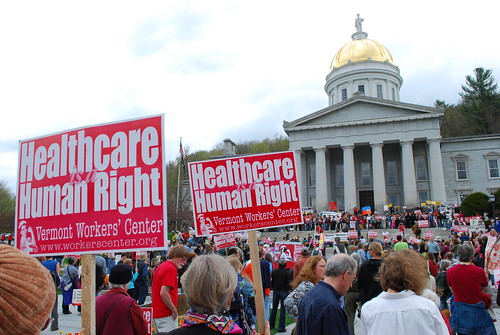Originally posted to Huffington Post
Amidst the celebrations of a ‘historical moment,’ a healthy dose of realism seems in order as we assess the new Patient Protection and Affordable Care Act and the related reconciliation measures. What is seen as a crucial victory for the Obama Administration has been won on the backs of many grassroots activists struggling for health care as a human right and a public good, including women’s and immigrants’ rights groups. The lengthy health reform process has mobilized many millions of people, some new to political activism and many others veterans of the long struggle for universal health care in the United States. This political moment presented a prime opportunity for finally ending the commercialization of one of our most fundamental needs, health care. The failure to seize this opportunity will haunt us for years to come.
What is now touted as the most far-reaching social legislation in almost half a century in fact bears no resemblance to the landmark Medicare Act of 1965, which instituted a fully public insurance system with contributions shared equitably by everyone, in solidarity with older people. Instead of expanding Medicare to everyone, this new law formally affirms and solidifies the private, market-based system in which health care is the domain of a for-profit industry propped up by substantial public subsidies.
Human rights standards do not tolerate the inequities inevitably linked to a reliance on market competition to meet human needs. Yet this legislation also contains some important improvements to health care access for poor people. The Medicaid expansion and the additional funding for community health centers are very welcome and long overdue, but could have been adopted as stand-alone measures. As such, they are indeed cause for celebration, yet most pundits seem to care precious little about these provisions of the new law, despite the fact that the Medicaid expansion will account for at least half of the newly insured population. Instead, all favorable attention is showered on the subsidized expansion of the private, for-profit health insurance industry.
Yet it is precisely this aspect of the new law — market-based health insurance reform — that entrenches the treatment of health care as a commodity by locking us into a market mechanism that sells access to health care based on a person’s ability to pay rather than their health needs. Public subsidies for pricey (and not price controlled) insurance products are intended to mitigate the inequities inherent in a for-profit system, while leaving no illusion that coverage will continue to be stratified and access to care out of reach for many. This volatile combination of at-will pricing by insurance corporations and the promise of subsidies to match prices also renders the system financially unsustainable for individuals and government alike.
In sum, the new health law fails to meet the key human rights standards of universality, equity, and accountability. Rather than guaranteeing universal health care, the law excludes many millions of people from access to coverage and care. Instead of ensuring that care is available for those who need it, the law makes access contingent on the purchase of private insurance. And rather than holding the private sector accountable for protecting the right to health, the law permits the industry’s focus on their bottom line. Health care is treated as commodity, not as a universal right and a public good shared equitably by all.
Many grassroots activists and their academic and advocacy allies, including the National Economic and Social Rights Initiative, have challenged this prevailing policy paradigm and presented solid evidence that health care financing and management through market relationships is unable to meet everyone’s health needs. In all other high-income countries, health systems are highly redistributive in economic terms, funded collectively through cross-subsidization with a common pool that includes all, not limited to residual public programs for certain groups. Yet Democrats in Congress and the White House did their best to silence these voices and insisted on a market-based approach despite their own better knowledge — the President himself admitted as much when he remarked that a single payer public insurance system would be necessary to achieve universal coverage. But this was not the route pursued by our legislators, and so a workable solution was jettisoned in favor of an ideological approach approved by the health care industry.
We can turn this moment into a historical one if we take it as a new beginning, not an end, for a human right to health care movement in the United States. Grassroots campaigns are well underway for universal health care at the state and even local level, for example in California, Vermont, and Montana. By using the human rights framework to guide us, we can build a broad-based movement that inspires solidarity for sharing the public goods required to meet our fundamental needs.
 While the Republicans cynically stall efforts on health reform to gain political advantage and the Democrats wrangle over special deals, too many people continue to die in this country because they lack access to care. A report released today from Amnesty International highlights the scandalous fact that every day in the richest country in the world 2 to 3 women die in pregnancy and childbirth.
While the Republicans cynically stall efforts on health reform to gain political advantage and the Democrats wrangle over special deals, too many people continue to die in this country because they lack access to care. A report released today from Amnesty International highlights the scandalous fact that every day in the richest country in the world 2 to 3 women die in pregnancy and childbirth.
 While protesters have been
While protesters have been